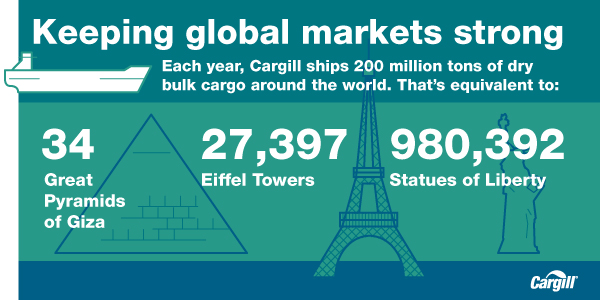Cargill connects global supply chains and joins shipping effort to act on climate
January 05, 2017
We often take for granted how easily we can access practically any good that we need in our daily life. We simply go to a shop and buy it. However, the materials and ingredients which make these products are often sourced from global locations. They need to be transported by land and sea before they are processed, packaged and placed in a store.
Global supply chains hugely depend on the shipping industry and the vessels that crisscross our oceans all year round to ensure that the different commodities such as grains and iron ore can reach global markets and arrive where they are needed. Every year, Cargill ships more than 200 million tons of dry bulk cargo on more than 500 vessels.

As one of the largest charterers of dry bulk vessels in the world, we consider the environmental impact of our ocean transportation network. Cargill is not only working to improve the efficiencies in our own business, we’re taking proactive steps to make our entire industry more sustainable.
We encourage the industry to use vetting systems such as RightShip’s EVDI to charter only the more efficient and environmentally friendly vessels. Recently, we joined the Trident Alliance as part of our commitment to comply with sulphur emission regulations, meeting the 0.1 percent standard. We are also an active participant to the Sustainable Shipping Initiative which makes us part of the wider industry dialogue on how to make shipping friendlier to the environment.
We also publicly supported the Carbon War Room’s industry letter to the International Marine Organization which called for having clear emissions objectives set for shipping.
“We need more of these types of actions to continue defining industry standards and driving improvements. Shipping is a key link in the supply chain. If our sector comes together to work with our industry organizations and governments and regulators to advocate for high, but achievable standards, I believe we are going to see meaningful improvements,” said Jan Dieleman head of Cargill’s Ocean Transportation business.
